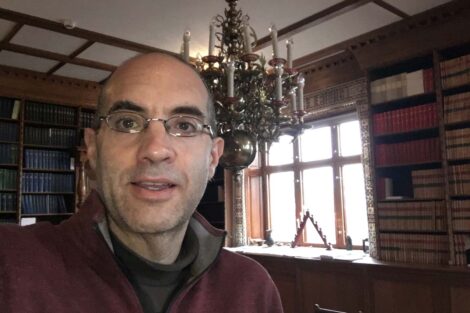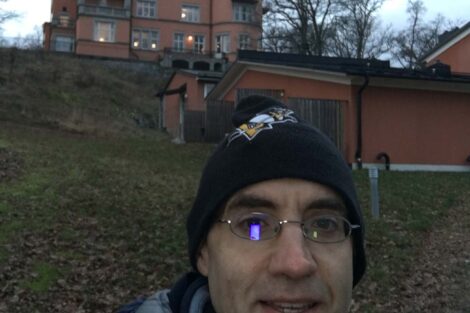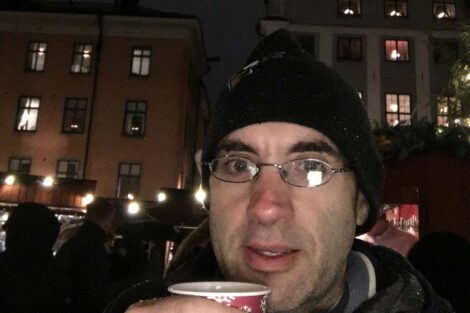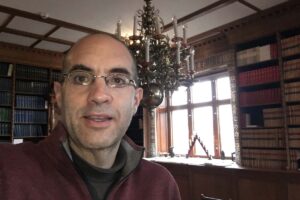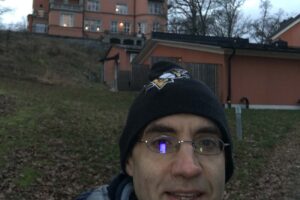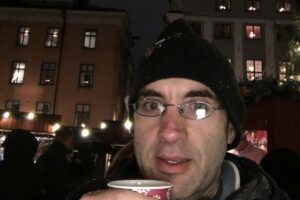How did you spend your yearlong leave from Lafayette?
My sabbatical year was based largely at home, working on research and writing. I was visiting faculty at Lehigh for the year as well, though just as I was spending more time there (partly meeting with a Lafayette student taking a course there and doing independent study with me!), schools were moved to remote learning because of COVID-19. Last summer, I traveled to Princeton to discuss a possible research project (now ongoing). I was supposed to go back for a follow up on progress made, but that was around the time COVID-19 travel restrictions started to be put in place, so I had to postpone, along with postponing an invited talk I was also supposed to give at Harvard.
The “big” travel for the year took me to Institut Mittag-Leffler outside Stockholm, Sweden, during their semester-long research program General Relativity, Geometry and Analysis: beyond the first 100 years after Einstein.
At my two-week stay at the institute, I attended seminars (and gave one) and discussed research ideas with a number of colleagues, and one such discussion proved particularly helpful in sharpening a result that I was writing up (and hope to revise soon). Another discussion led to some questions for further work yet to pursue.
What were your objectives for your time away?
Whenever I get a break from teaching, I aim to catch up on research projects/writing in progress and find directions for new projects. I also try to catch up on referee work, doing peer review for articles submitted to research journals. This part of the job can be significant: Some long and technical articles can take a lot of time and energy to review. Critical reading and evaluation of new work can be a great way to learn, especially if it’s related to but a bit of a stretch from one’s own work.
What were you seeking to address in your research?
My work has largely focused on questions in geometric analysis (differential geometry, partial differential equations) arising from Einstein’s theory of gravitation. To be more precise, my work deals with understanding aspects of the space of solutions to a system of differential equations governing allowable initial data for the Einstein field equations, from which one can understand aspects of the space of solutions to the full field equations. Recent work in particular has been aimed at understanding certain non-vacuum situations that couple geometry with matter fields, and extensions of certain ideas have proved more interesting in ways that I did not appreciate at first blush.
How did you conduct this research?
I’m pretty “old school” about it. I need a comfortable chair (one that rocks preferably), access to books and papers, and a lot of scrap paper. And coffee. In particular, a lot of how I work is pretty much set up for the social distancing we’ve been under this spring. Indispensable are bike rides or 30-minute sessions on the erg at home to help get the blood flowing when I’m stuck on an idea.
That said, what’s helpful (sometimes crucial) is to punctuate that with contact with colleagues for when you’re stuck, or want to discuss partial progress.
I was hoping to host a colleague of mine here for some collaborative work this spring, but alas, that was not possible at the current time. Things to look forward to at the other end of this!
What progress did you make?
A manuscript for a journal article was nearly finished in the winter when discussions with a colleague allowed me to sharpen my approach. There were several technical improvements made at that time, one of which marked the end of a long and tortuous process of trying to prove something (and rediscovering something I’d studied years ago), and the other of which was based on those discussions with a colleague on how “best” to frame modeling physical matter coupled with geometry. While it’s too technical to describe here, I will say that the result extends earlier work showing that one can approximate certain kinds of solutions by solutions with some particularly “nice” properties. Such works can be useful for technical ingredients for other results, but also for a better understanding of the space of solutions, how the geometry and analysis interact with concepts coming from physics, like the energy and linear momentum of an isolated gravitational system. I hope to finish this work next month.
Another work, still being sharpened, constructs initial data for the Einstein equations of a very specific form, incorporating a number of different “bodies”; since the equations are nonlinear, superposing individual solutions is a nontrivial problem from analysis. I have earlier work constructing certain kinds of such data, but the extra requirements for the work in progress required some more technical care.
A longstanding collaborative book project on some mathematical aspects of Einstein’s theory of gravitation is nearing completion as well. As soon as I’m done replying to these questions, it’s back to the galley proofs!
Finally, final revisions were completed on a work that was several years in the review process at a top journal. So exciting to finally see it in print!
How does this research relate to your teaching?
Time away from teaching tends to afford me time to explore a bit, and sometimes to gather some ideas for future honors thesis projects.
I’ll be teaching Geometry this fall, and thinking about the geometry of space and time while away gives me ideas for how to frame the material—how to better connect classical ideas to ideas being developed today.
Sometimes just having the space and time to think about something deeply, whether it’s something you’re re-examining, or something new, gives you insight into how to better teach, or maybe something serendipitous occurs that suggests how to frame some idea to open up a line of thought to a student.
What do you plan to address next in your research?
I wish I had gotten to a point on this sabbatical where I could spend the summer hammering that out. However, with so many “balls in the air” at this point (book manuscript, journal articles, articles to referee, and fall teaching), I’m trying to be laser-focused on finishing the current docket of work I’m in the midst of at this point. At the very least, I anticipate trying to extend previous work of mine to settings involving one or more matter models of physics, and hoping to find that it’s not routine, but that some interesting aspects coming from geometry, analysis, and physics are uncovered in the process.
Aside from your research, what else did you do on your leave?
With the COVID-19 situation cutting off travel, I’ve been at home most of the time. I’ve definitely been cooking more at home, trying to nail down the perfect bolognese (ragù), working on my risotto, as well as chana masala—got an old family recipe from a former student, and the last batch I made really nailed it! I miss going out to cafes to have coffee while working, but I’ve been making my homemade lattes with my Italian “moka” on the stovetop.
At Thanksgiving, my kids traveled with me to Stockholm. We had Swedish meatballs for Thanksgiving … seriously … and not from IKEA (no offense to theirs). Years ago my family came with me when I spent the entire fall semester on research leave at the Institut on a Fulbright grant. This was in 2008, so the kids were so little. We retraced some of our steps from that year, from where we lived to where they went to pre-school, to the Christmas market in the old town. Then the kids flew back (unaccompanied) to the USA while I went on to the institute.
We were planning to take a family trip to Italy to spend time with my cousins there. As we have had to postpone this, we’ve had numerous Skype calls with relatives there, which while not perfect, have been great—to be able to share this trying time with family near and far.
What was the highlight of your yearlong leave?
On a personal level, traveling with my kids and rekindling some memories of when they (and I) were younger, was precious.
What have you missed most about Lafayette?
Honestly, I miss meeting with students over coffee, whether at Cosmic Cup or Skillman Cafe. I love when I’m working in Skillman and hear “Hi JC!” from a present or former student. I look forward to hearing that again, once things are back to normal after COVID-19 is under control.
What are your plans for the summer?
As travel plans have been postponed, the summer will bring more of the same: doing math (writing, research), preparing for fall courses and independent studies, and going for bike rides! My kids and I plan to make some spaghetti alla chitarra (with my grandma’s Italian chitarra) and some French macarons to get us through the NHL playoffs (Go Pens!). Planning for fall courses will soon take up a bigger portion of my time, due to the exigencies of planning for teaching in this pandemic. I also have a few very interesting, long, and somewhat technical articles for peer review awaiting my attention—I think those are best for rainy or unbearably hot summer days indoors!
